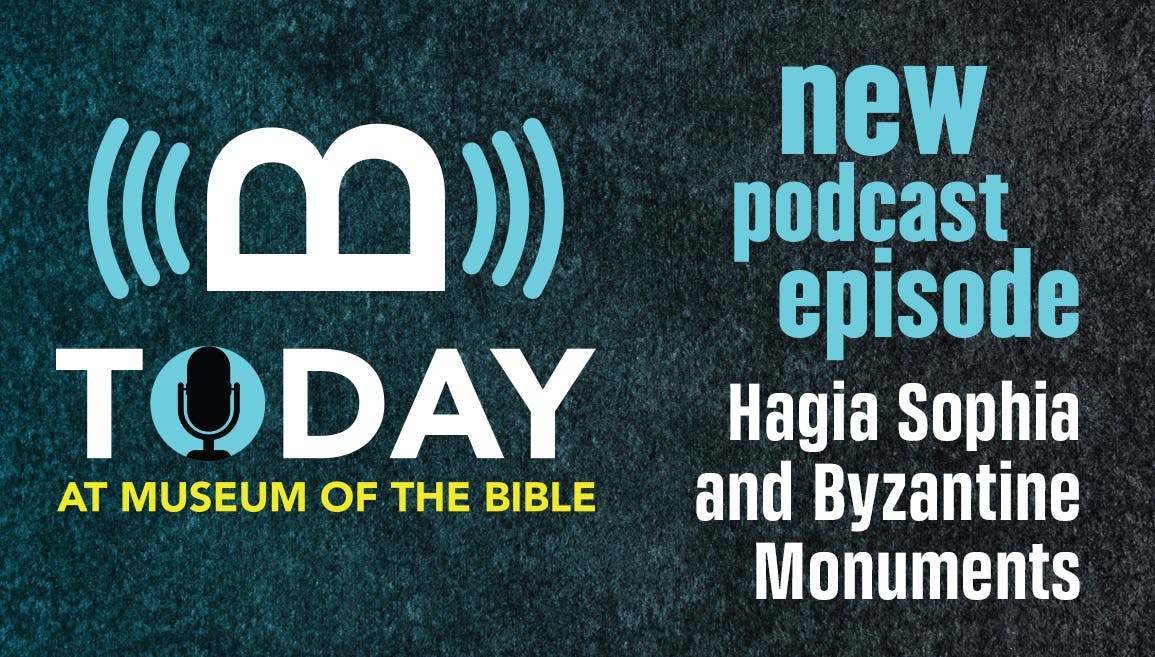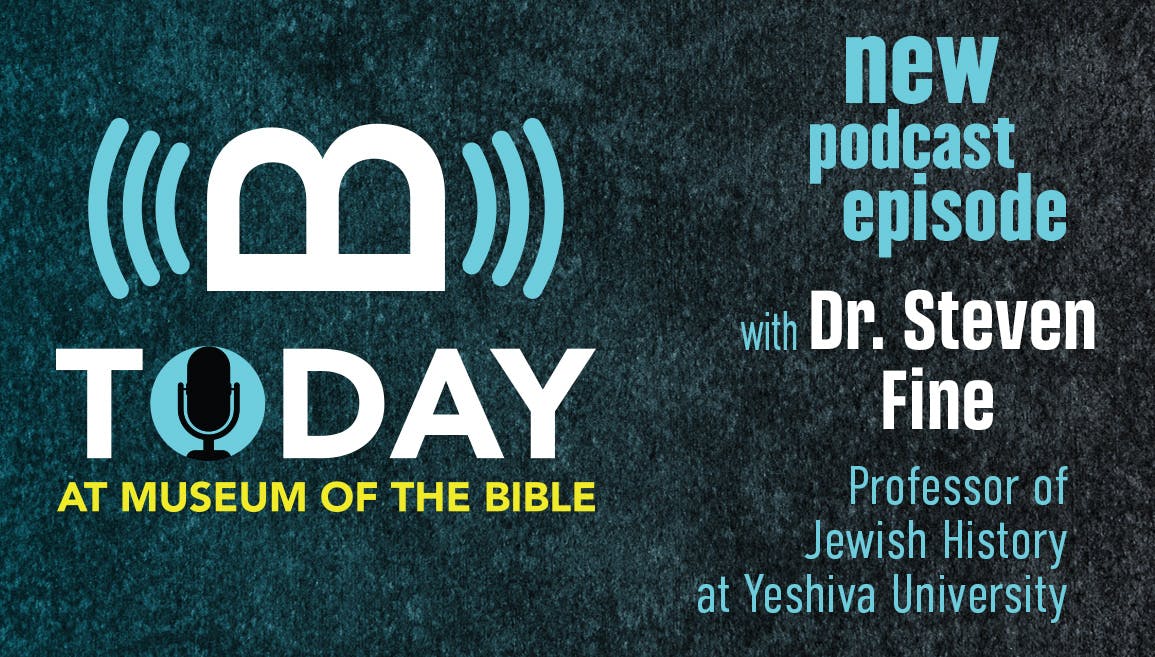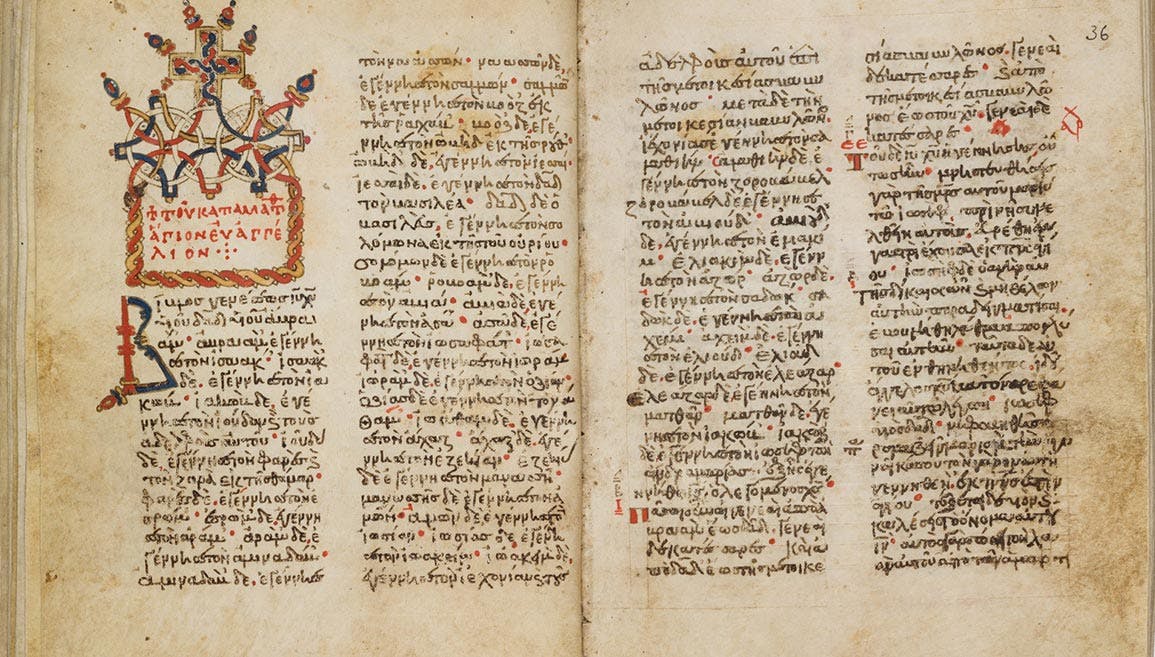From the Podcast: Dr. Ralph Leo

Recently, on our podcast, Today at Museum of the Bible, Chief Curatorial Officer Dr. Jeff Kloha interviewed historian Ralph Leo. Below is an excerpt of their conversation.
The following interview has been edited for clarity and space. To listen to the whole interview, check it out on our podcast, Today at Museum of the Bible.
Jeff Kloha: Welcome to Today at Museum of the Bible. I’m here today with Dr. Ralph Leo, who might have the most unique and interesting role I’ve encountered. He is professor of history at the United Arab Emirates University in Abu Dhabi, and he’s also a chairman of the board of Kanad Hospital, which is a Christian mission hospital in the UAE and a very unique situation. So welcome, Ralph.
Ralph Leo: Thanks, Jeff. It’s great to be here.
Jeff: We’ve been talking to Ralph because one of the topics in our museum is the impact of the Bible on healthcare. And the Kanad Hospital is a really significant story in the history of the impact of the Bible on healthcare in a very unique way. So, why is there a Christian hospital that openly talks about the Bible in the United Arab Emirates (UAE)?
Ralph: It does seem like a bit of an oxymoron, doesn’t it? But it’s funny how when people have real needs, real felt human needs, and people are willing to meet those needs, things like religious differences and sectarianism tend to go out the window. And in this case, that’s exactly what happened. The hospital is actually established in a part of Arabia that was very traditional until today. It’s actually quite traditional in the city where we are, called Al Ain, in the Emirate of Abu Dhabi, in the United Arab Emirates. But it started before the UAE was even a country, and it was a very traditional place. At that time, the bedouins of that place hadn’t really had much or any contact with outsiders, especially with Christians or Western Christians. So, when Sheikh Shakhbut and Sheikh Zayed, they are two brothers from the Al Nahyan family, who is the ruling family and still is the ruling family of Abu Dhabi and of the United Arab Emirates, they called these doctors for help and said, do you think you can establish a clinic or a small hospital in our area?
Jeff: Oh, really?
Ralph: When the call went out for help, the infant mortality rate was 50%, the maternal mortality rate was around 33%, so the population was actually in decline. And it just so happened that Sheik Zayed — who established the nation in 1971 — and his wife were expecting their first child. And if she was going to give birth, this was going to be a very important pregnancy and delivery. And so it just happened that the doctors arrived in November 1960, and that was Dr. Marian Kennedy and Dr. Pat Kennedy. She was an obstetrician-gynecologist, and he was a general surgeon; great combination for a mission like this. So they got there in November 1960, and on March 11, 1961, the little baby is born. And it turns out that this little baby boy, Mohammed, is the son of Sheik Zayed, who became the crown prince and now eventually, in the last couple of months, has become the president of the United Arab Emirates. So since then, there’s been this unbelievable warmness between the ruling family and the hospital that has continued for six decades. And it’s as warm now as it’s ever been.
Jeff: You told an interesting story about the introduction of the Bible into these areas. That initially, the missionaries came and thought giving away Bibles was a good idea, but it turned out not to be. Right?
Ralph: Exactly. Even today, most of us think, oh, it’s a great idea to just give away Bibles. And when they got there, they realized that wasn’t the best idea. Because when you give a book away for free, you’re basically communicating that it’s not very expensive, it doesn’t have high value. So, they began to charge a nominal fee for these Bibles and as soon as they did that, they started to fly off the shelves. It became a big deal. It was a hot commodity to get this book. And in some cases, they would sell 200, 300 Bibles a month all around the Arabian Gulf. It’s very interesting. And they did this in cooperation with the British and Foreign Bible Society, which exists today.
Jeff: The Kanad Hospital, as I understand, is the only place in the UAE where you can buy a Bible still today.
Ralph: Yeah, you don’t have to buy it anymore. I guess we moved away from that a little bit. It is available freely there at the hospital. But yeah, the Bible is still not as widely available as you might expect, even in big bookstores and things. You actually don’t find it in Arabia even today. But you do find it at the hospital.
Jeff: And I found it interesting that you have, in the lobby of the hospital, biblical verses, first from the Gospels. In other words, you don’t shy away from that as part of your identity.
Ralph: The reason is because the ruling family had a deep respect for these people from day one. And they said, look, we trust you. There was mutual trust there. The American missionaries trusted the ruling family. The ruling family trusted them in return. And they said, we don’t feel any threat from you having the Bible, reading the Bible, praying, practicing your faith as you normally would. In fact, people from the very beginning have welcomed the doctors praying for their patients and asking the blessing of God upon them. We often will get people who ask our physicians to pray for them, for God to bless them. And so it would be natural then that we would have Matthew 11:28 inscribed in the entryway, “Come to me, all you who are weary and burdened, and I will give you rest.” And that’s exactly what a hospital should do.
Jeff: That’s fascinating. Talk a little bit about the Abraham Accords. It has been significant in the news, although many people might not be very familiar with it and how this Christian mission hospital had a role to play in that.
Ralph: It’s fascinating, really. The United Arab Emirates was the first Arabian Gulf nation to normalize relations with the state of Israel two years ago. And that was really big news because a lot of people talk about peace and making peace, but who’s going to make the first step, right? And it was Sheikh Mohammed bin Zayed, and it was the United Arab Emirates to make the first step. Immediately after that, Bahrain followed suit. It’s not a coincidence that it was Bahrain, because it just happened to be the other country with this American Christian mission hospital. And after that, it was Morocco, and I think it was Sudan. And just kind of a domino effect of Islamic nations that have never had ties, formal ties with Israel. All of a sudden, they normalize relations. And so this was a big shock and a big surprise and very welcomed, I would say, by both Jewish people as well as many Arabs.
Jeff: That’s amazing.
Ralph: Sheikh Mohamed today, if you were to talk to him about this, he uses the word family. He says we are family. And he’s talking about these Christian people. He says we are family. So out of that mindset, it’s kind of impossible then to say that we’re going to have these big divisions. And so there’s this Abrahamic family, you might say, between Christianity and Islam and Judaism. And Sheikh Mohamed definitely welcomes that concept.
Jeff: So remarkable. Just a Christian couple going to care for others in very fundamental ways, showing love, getting nothing back, basically living in the desert, and these amazing things happen totally unplanned.
Ralph: Yeah. We’ve had now four delegations from Israel who have come to the hospital seeking understanding into the spirit behind the Abraham Accords. Isn’t that interesting that they have traced it back to that? We also had a delegation from Israel, the United States, and Bahrain recently coming through at the request of His Highness. He said to them, you should see this hospital if you want to know something about the spirit of this nation of tolerance. It’s the word they use over there, is tolerance in Arabic. It’s al-tasamuh. It has a bit of a more rich meaning in Arabic. It’s kind of an acceptance and an openness and collaboration and willingness to work together beyond differences. It’s a value in that society, in that culture that goes back to kind of the founding and the roots of the hospital and the relationship between Sheik Zayed and the Kennedy family. And it’s always been that way. And that’s what you’ll find if you go to the modern United Arab Emirates today. They’re leading the region in terms of openness and acceptance. It’s not like what a lot of people would picture when they picture the Middle East. It’s very, very different.
Jeff: Well, Ralph, it’s been great to have you here at the museum for a couple of days. And hopefully, it looks like we’ll do a lecture with you guys in maybe January or February.
Ralph: We would be honored.
Jeff: To tell this great story. It’s amazing. It is. It’s a story the world needs to know.
Ralph: It’s a love story, really. There’s a deep love between the hospital and the people, and it’s authentic. It’s not manufactured. I tell you, if you come and you visit and you see it firsthand, you will know how real it really is. We welcome anyone to come visit.
Jeff: Wonderful. Look forward to it.
Ralph: Thank you.


